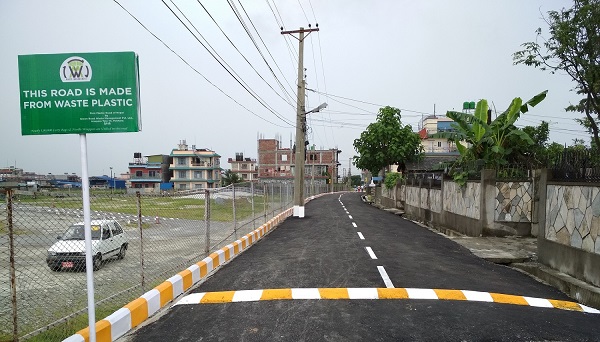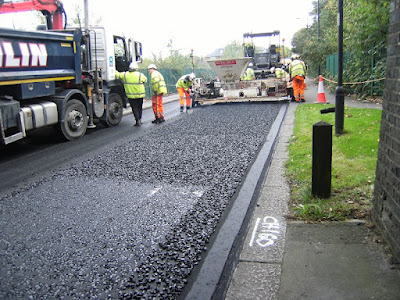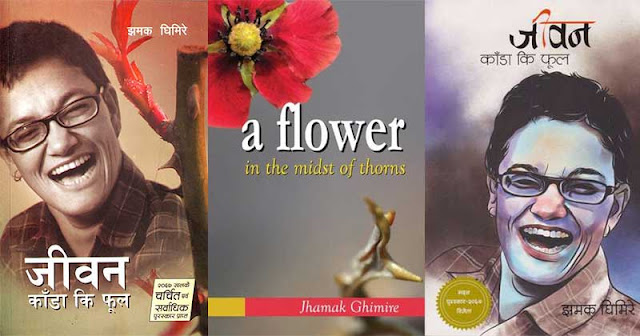NEPAL’S FIRST PLASTIC ROAD: A technology for future
 |
| For the first time in Nepal, Pokhara-based Green Road Waste Management Company builds a road with the use of waste plastics. Photo LB Thapa |
The evils of plastics are known to the world because they do not biodegrade and therefore plastics can remain in landfills and rivers for centuries. Taking the evil effects of plastics into consideration, the government of Nepal did put a ban on the use of plastic bags. However, due to weak implementation, plastic bags are still in use right under the nose of the government.
At a time when the use of plastics has taken off the sleep of the world, a Pokhara-based Green Road Waste Management Company has come up with an innovative idea of making roads with the use of waste plastics.
“Traditional way of making roads is expensive. The use of bitumen mixed with asphalt increases the cost of road construction. We use the solution of waste plastics into bitumen mixture so that the quantity of expensive asphalt can be reduced to a great extent. The roads made with waste plastics are cheaper, long-lasting, and environment friendly,” said Bimal Bastola, the engineer of the company.
Green Road Waste Management (GRWM) has become Nepal’s first company to use waste plastics to make roads. Recently the company has made 100m roads at Anupam Marg in Pokhara-14. To build this road, of the 2,475 liters of bitumen, up to 16% was plastic.
“The use of plastics saves Rs.200,000 per km of road. That means if 200km roads are made with waste plastics it will save Rs.20 million”, said civil engineer Rajiv Subedi of Green Road Waste Management.
Prior to making this road, the Green Road
Waste Management team had spent about a week in Bhutan, where they studied the
effectiveness of this technology. In fact, making roads with plastic may be a
new technology for Nepal, but this technology has already been in use by many
countries including India, Bhutan, the UK, and Australia. Photo: worldhighways.com
Spending a week in Bhutan had been proved extremely fruitful. The Green Road Waste Management team was contented with their understanding of the use of plastic in road-making technology. Using their knowledge, Bimal Bastola, the engineer at Green Road Waste Management, seems to be satisfied with the 100m road he has constructed at Anupummarg, Pokhara-14.
“The road we have made is just on a trial basis. It is only 100m long but I am convinced about its success. Soon our company will get big contracts from the government and we will be busy constructing plastic roads in the country”, said engineer Bimal Bastola.
In fact, for Nepal, this technique may be new but in India and elsewhere it is not. India, for the first time, used waste plastics in road making in 2001. Since then India has made over 100,000km of roads and Bhutan has made over 200km of roads.
Only last year Indian government did
announce the investment of 6.9 trillion rupees ($11 billion) to build 83,677km
(52,000 miles) of roads in five years. About 11 Indian states have used this
technology to build more than 100,000 km of roads. Indian city Indore has won
Two-time India’s Cleanest City titles. Indore recycles 100% of its plastic
waste and uses 5,000 kilos of waste plastic to build 45km roads in two years. Photo: captain-planet.net
Plastic roads are found better resistant to water stagnation and these roads have less water clogging during monsoons. In short, the life span of plastic roads is much better than traditionally tarred roads.
When asked how plastic waste is used to make roads, Bimal Bastola, engineer, said: “Once all the plastic waste is shredded into fine pieces they are heated at 1650c. Bitumen is added into the mixture and again heated at 1600c to make the final substance for constructing roads. As per the quality of tar, 10-30% of it is replaced with waste plastic. The interesting thing is that both plastic and tar are petroleum products, which is why they gel well together”.
Using waste plastics of urban areas to make into roads is the best remedy for environmental degradation. In fact, the growing use of plastics in modern times is hard to stop completely. In a situation like this, roads made with plastic can bear heavy loads and resist water for a longer period in comparison to traditionally build roads. Such characteristics make plastic roads strong and durable.
 |
| Photo: LB Thapa |
Many times whales and turtles consume plastic bags thinking of jellyfish. Sea birds and mammals get attracted to brightly colored plastic items floating on the ocean surface, which they ingest and die. It is estimated that every year about 8 million tons of plastic waste is dumped into the ocean. If this practice is continued unabatedly, then by 2050 there will be more plastic in the ocean than fish.
Over the years, many countries have taken cudgels in their hands to fight against plastic pollution, but without much success. It seems that concerted efforts from all walks of life must be needed to put a tab on plastic waste. Among others, plastic waste has emerged as one of the major threats to the existence of all living creatures.
Getting rid of plastics is easier said
than done. There are so many plastic-made items available on market, which
people use in their daily life, and avoiding them completely is next to
impossible. However, collective efforts of the people and governments can help
reduce the severity of the plastic threat. The first step of getting rid of
plastics is to Reduce, Reuse and Recycle. Efforts should be made to cut short the amount
of plastic waste from reaching landfills and water bodies. In nutshell, the
use of plastic waste in road making will largely protect the world environment
from its rapid deterioration. LB Thapa is a Pokhara-based freelance writer and author.
LEGAL
WARNING
All rights reserved. No articles and photos published in this blog can be reproduced without the prior written permission of the author. Legal action will be taken immediately if any articles or photos are reproduced without the author’s knowledge. However, articles or photos can only be reproduced by duly mentioning the author’s name and the blog's name (read2bhappy.blogspot.com). The author must be informed by sending an email. All articles and the photos published in this blog are the copyright property of LB THAPA.













.png)
This is one of the greatest achievement in the history of our country Nepal. I was very curious to know about the making of Plastic road and finally i got chance to know about it in depth, thanks to the author. Now that this method of Pastic-bitumen composite roads have better resistance than asphalt concrete roads and also it saves the cost for the construction it must be implemented in several other places too. I further studied about the topic and there were few drawbacks like leaching problems, sticky layer and in the presence of chlorine releasing of noxious HCL gas may occur. So, As far as possible such problamatic substances should be avoided and timely repairs and maintainance of such roads need to be done. Other than that, I think the idea is excellent and can be of great use in future.
ReplyDeleteThank you Mr. Sagar Acharya for your comment.
DeleteWell researched and well written article. Kudos for the writer.
ReplyDeleteNikesh Shrestha
Pokhara
Thank you Mr. Nikesh for finding my article readable. I'm really encouraged by your comment.
DeleteWhy is Nepal government not making more roads of this kind?
ReplyDeleteHari Bhattarai
Pokhara
Very nice article. Full of knowledge. I did not know there was a road in Pokhara which was made of plastic rubbish.
ReplyDeleteShruti Shrestha
Pokhara
Good idea. If plastics are used for road making then too much plastic rubbish will be used and our city will be a better place to live in.
ReplyDeleteBinita BK
Pokhara
I'm surprised to see you writing so many nice articles almost every week or even before. How do you manage your time to write so much, man?
ReplyDeleteRajesh Regmi
Kathmandu
👍👍👍👍
ReplyDeleteVery informative article.
ReplyDeleteDinesh Shrestha
Pokhara